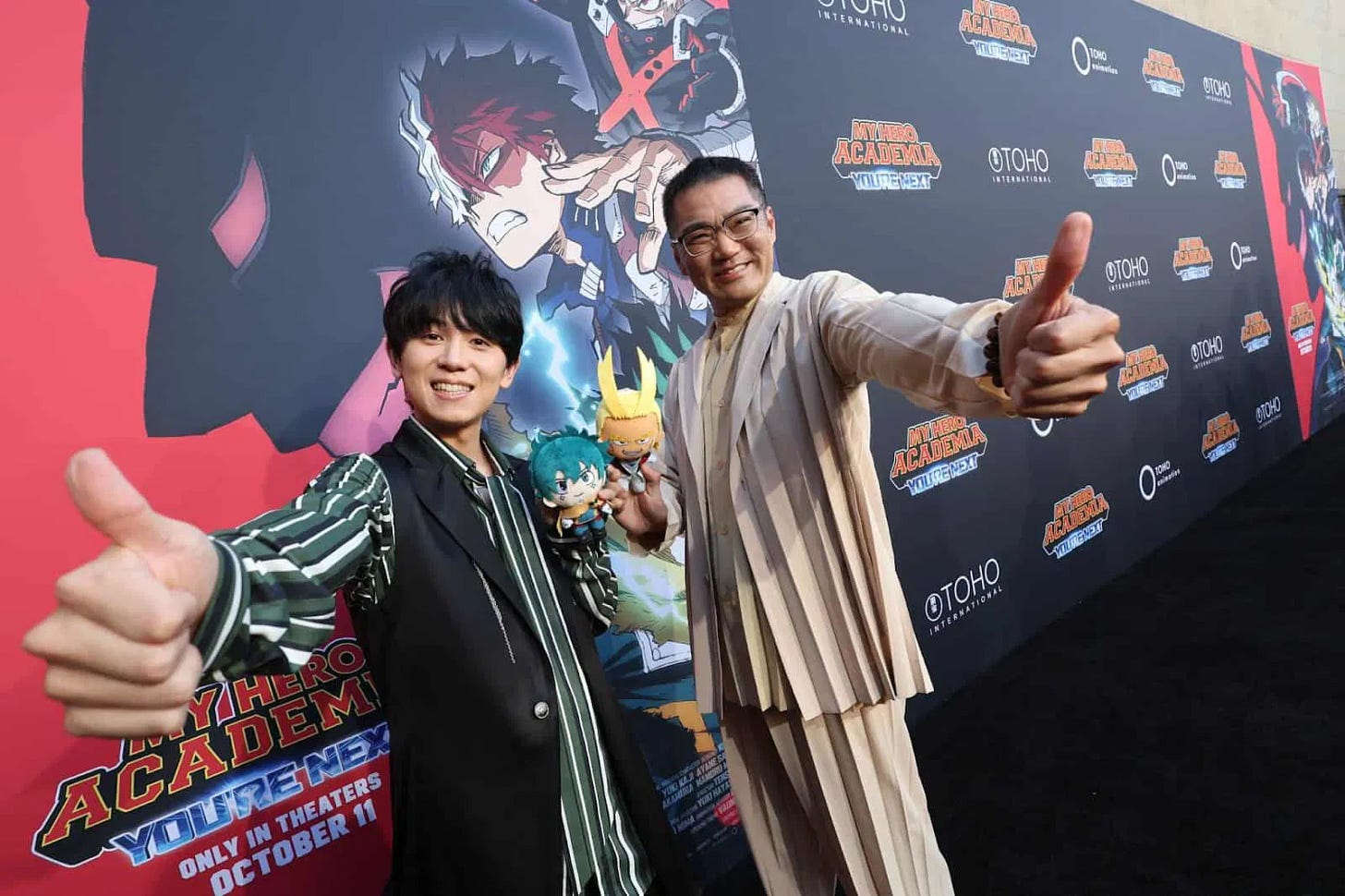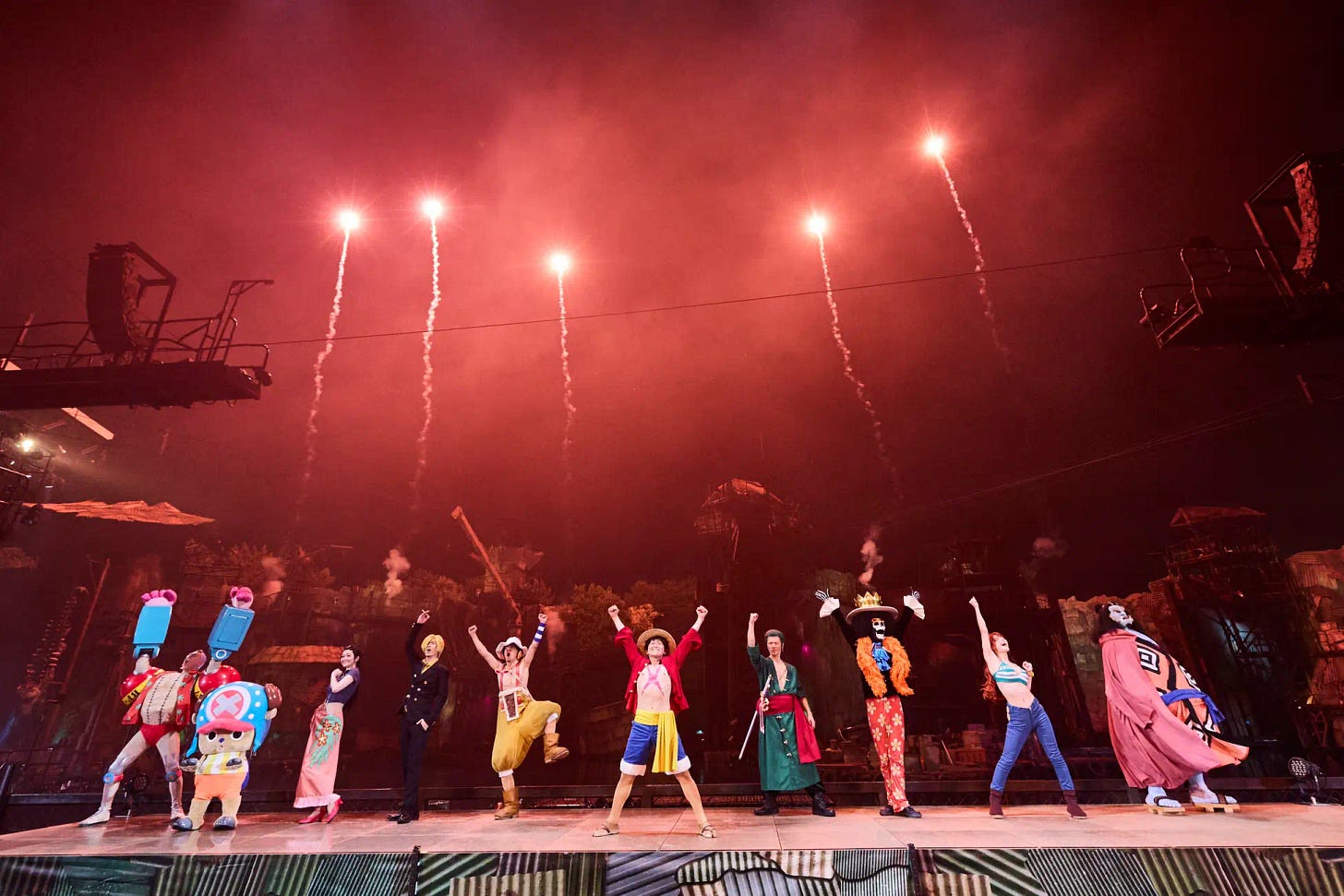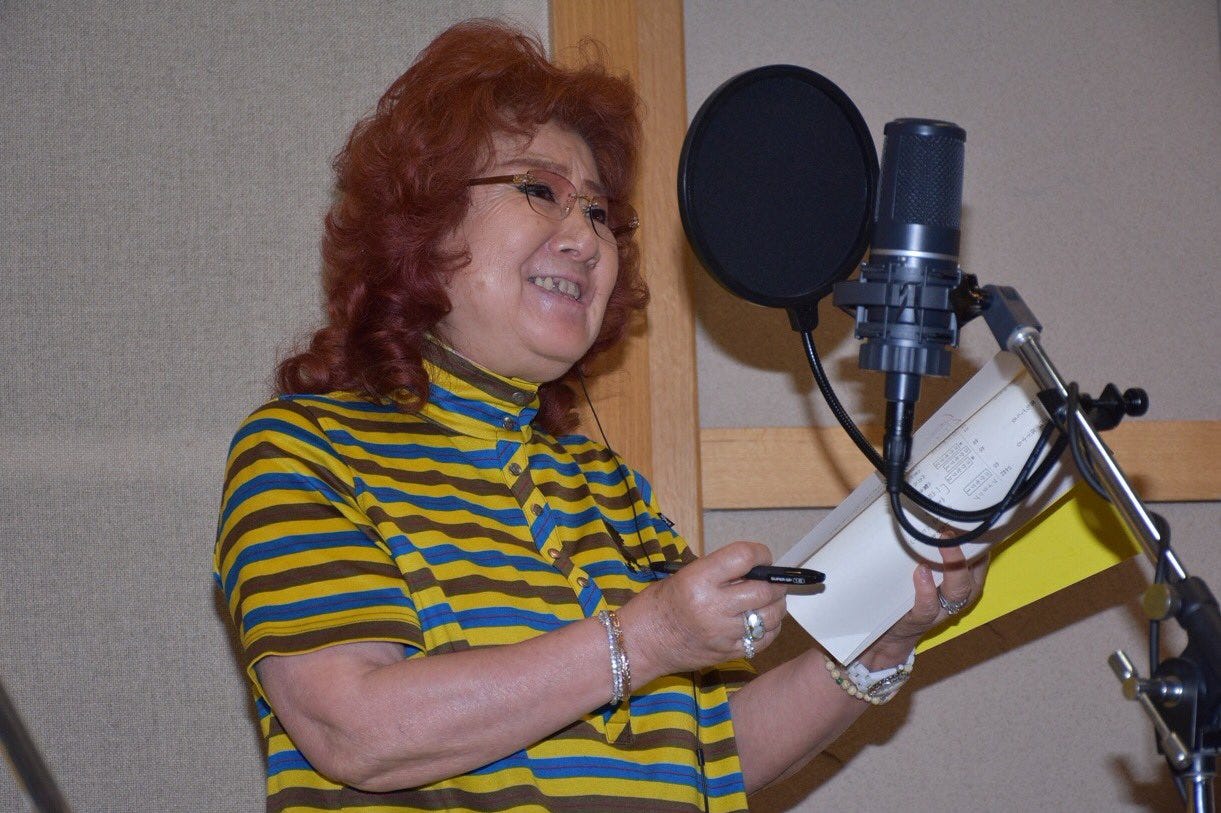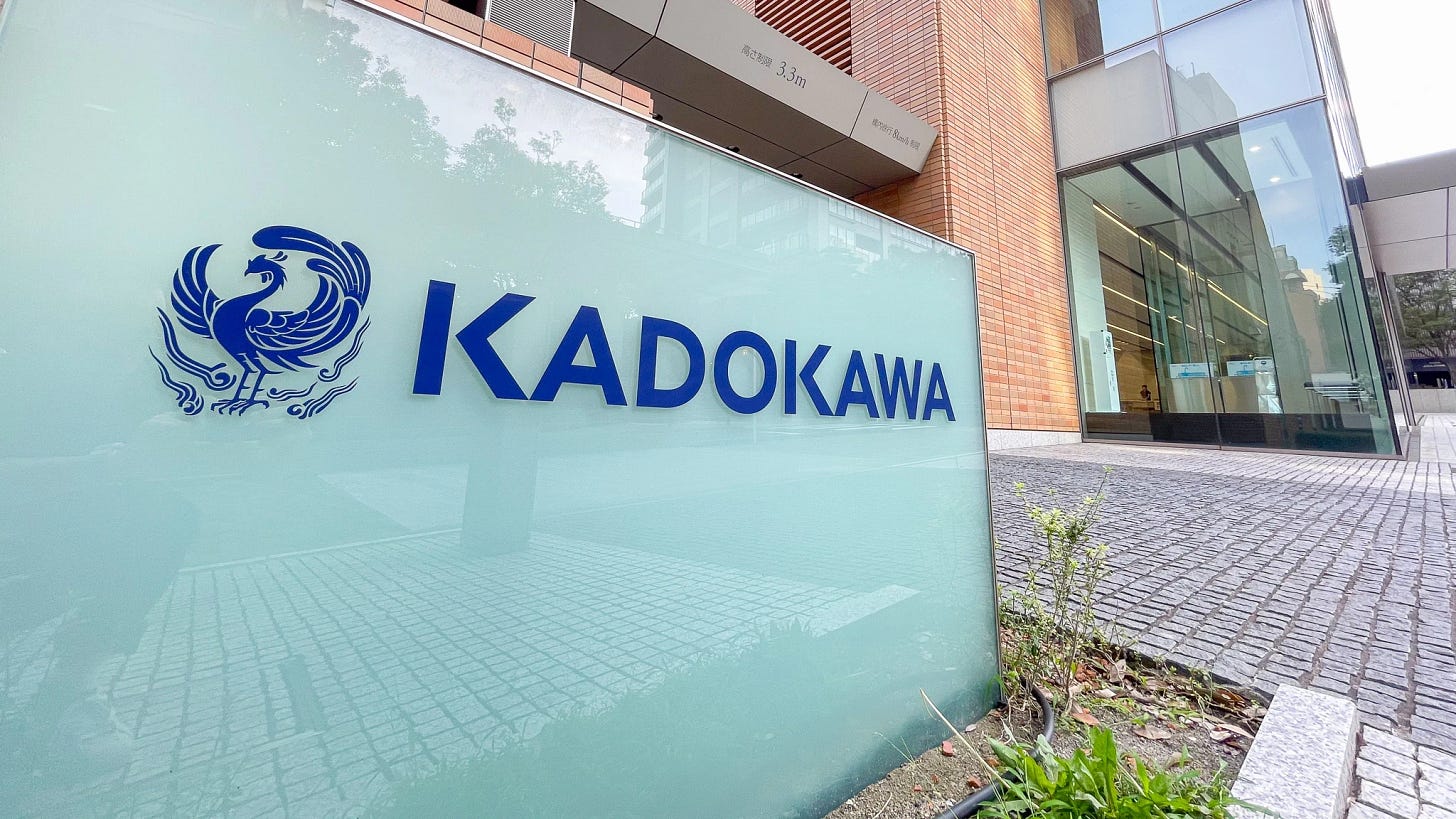Toho tests U.S. anime film release strategy
Plus: Kadokawa develops AI translation system; 'One Piece' goes to Universal Studios Hollywood; AI startup converts voice actor speech into other languages; and more
This is your weekly Animenomics briefing, covering the business of anime and manga. Today is Wednesday, October 9, 2024.
In case you missed it: I spoke about Indonesian animation studios’ growing role in supplementing Japan’s anime workforce in a Nikkei Asia story published this week. A Japanese version of the article is also available.
Help make my work and future collaborations with other publications possible by upgrading to a paid subscription of Animenomics.
Toho takes ‘My Hero Academia’ directly to U.S. cinemas

My Hero Academia: You’re Next, the fourth anime film based on Kohei Horikoshi’s manga, opens in the United States and Canada on Friday and will serve as a test for Toho’s new direct distribution strategy in North America.
Why it matters: Toho is forgoing its past relationship with Crunchyroll Films (formerly Funimation Films), which distributed the last three My Hero Academia films, in favor of marketing and releasing this next film by itself.
Toho International, a Los Angeles-based subsidiary, negotiated directly with cinemas to put My Hero Academia: You’re Next on North American screens.
What changed: Godzilla Minus One, Toho International’s first distributed work, earned US$56.4 in the North American box office and went on to win an Academy Award in March.
Toho is now taking the learnings of that campaign and applying it to the release planning for My Hero Academia: You’re Next, Gamebiz reports.
The company’s goal, says the website, is to maximize profits in overseas markets and in anime, critical areas for its medium-term growth strategy.
Rewind: As previously reported by Animenomics, company president Hiroyasu Matsuoka said last year that Toho already sees better revenue and profits from its film releases in North America than in other markets.
Crunchyroll and Sony Pictures Releasing International still handle distribution of My Hero Academia: You’re Next elsewhere around the world.
Zoom out: The film is on track to earn ¥35 billion (US$24 million) in Japan since its release in August, earning more than previous theatrical installments.
It also capitalizes on the publicity around the original My Hero Academia manga’s ending that happened at the same time as the film’s release.
Kadokawa develops AI translation amid global growth
Light novel and manga publishing giant Kadokawa is developing an AI-assisted translation system as the group grows its publishing and distribution businesses outside Japan.
Why it matters: Kadokawa’s expansion in the past couple of years in markets like Southeast Asia, Europe, and South Korea means there is a need for more content translated into local languages.
What’s happening: Kadokawa was one of four manga publishers that announced investments in Mantra, a developer of AI-assisted translation technology, in June.
Kadokawa also established a translation management department to improve the process of selecting works for translation and publishing them, according to the company’s newly published annual integrated report.
By investing in Mantra’s translation tools, the company hopes to make the work of translating manga more efficient and reduce the time to market.
The bigger picture: Kadokawa envisions a publishing landscape where overseas territories aren’t just places to sell content, but also to source content.
Chinese-language web novels from Taiwan and comics from Malaysia are among examples of works the company has adapted into Japanese.
What we’re watching: Four years from now, the company wants to be publishing 7,000 books from new and existing titles a year, up 20 percent from today’s level.
To meet this target, Kadokawa has grown the headcount of its editorial teams by more than 20 percent to more than 730 people.
Clippings: Universal Studios Hollywood gets ‘One Piece’

One Piece and Jujutsu Kaisen will debut at the Universal Studios Hollywood theme park in Los Angeles next spring, bringing to the United States for the first time two of Universal Studios Japan’s anime-related attractions. (Theme Park Insider)
Unlike USH’s Super Nintendo World that opened last year, the One Piece and Jujutsu Kaisen attractions will be planned by USJ staff, Nikkei Asia reports.
As previously reported by Animenomics, the popularity anime and video games attractions pushed USJ past Tokyo Disneyland to become the third most popular theme park worldwide last year.
Naver’s Webtoon Entertainment WBTN 0.00%↑ has seen its share price fall by more than half since debuting on the Nasdaq stock exchange in June as financial losses mount at the company. (Maeil Business Newspaper)
Translation service Translators United, used by the DLsite marketplace for self-published manga to crowdsource translation from Japanese into other languages, has generated ¥1.5 billion (US$10.1 million) in revenue in three years. (Gamebiz)
Anime director Hideaki Anno’s Khara anime studio has acquired the rights to produce a new anime based on Star Blazers: Space Battleship Yamato and to build a franchise business with the property. (Animation Business Journal)
Anime tourism promoter switches top leadership posts
“At first, I didn't like anime tourism because I thought it was just about getting people to travel. But after reading the messages from fans, I realized that people who had only seen the fantasy of the anime were now visiting real locations. I thought it would be worthwhile to spread the hidden charms of Japan there.”
— Yoshiyuki Tomino, outgoing Anime Tourism Association president
Context: Tomino, best known as the creator of the Mobile Suit Gundam franchise, spoke about his tenure as president of the Anime Tourism Association, at a panel discussion to promote Expo 2025 in Osaka.
What he’s saying: Traveling to unfamiliar locations that inspire anime scenes can help fans gain appreciation for Japan’s diverse landscapes, Tomino says.
Macross anime series creator Shoji Kawamori, who is succeeding Tomino as the association’s president, has been tapped to create a biodiversity pavilion at Expo 2025.
Between the lines: Anime tourism has emerged over the last decade as a strategy to spur revitalization in Japan’s rural regions, and local governments collaborate with producers to highlight the charm of their towns.
Today, four dozen Japanese cities and prefectures are members of the Anime Tourism Association.
Public voting for the 2025 edition of the association’s top 88 anime tourism sites is open through October 15.
AI startup turns voice actor speech into other languages

A collaboration between one of Japan’s leading voice actor agencies and a startup developing AI voice synthesis could bring voices of anime performers to personal smart devices abroad.
Driving the story: Aoni Production will allow Tokyo-based CoeFont to use the voice data of ten voice actors to train the startup’s AI voice synthesis tools.
Masako Nozawa, known for Dragon Ball’s Son Goku, and Banjo Ginga, who gained fame through Mobile Suit Gundam, are among the actors whose data will be used.
The details: CoeFont will render the voice data and use AI to synthesize speech in other languages like English and Chinese.
Yes, but: The voices will be created for use by navigation systems and robots, not in foreign-language dubs of anime or other screen productions.
Catch up quick: As previously reported by Animenomics, CoeFont first gained national attention two years ago when medical patients with damaged vocal chords used its AI service to recreate their voices.
The company says its AI-driven technology can recreate voices with just 15 minutes of vocal recording.
Last year, CoeFont worked with the Ken Production voice actor agency to recreate the voice of actor Kenji Utsumi, who died in 2013.
Animenomics is an independently-run and reader-supported publication. If you enjoyed this newsletter, consider sharing it with others.



